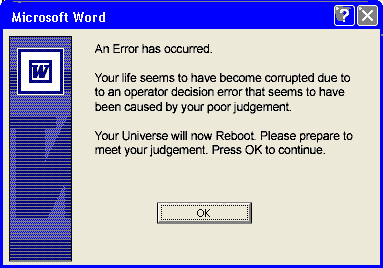That is, of course, assuming that you want to change. I suppose if you have a high self esteem and believe your flaws are little or non existent then there is no impetus for change, but I see that as an arrogance on the part of any man who makes such a claim, and an indication of poor self awareness. Or at the very least, an insensitivity to ones impact on other people.

I mean, if you are an introspective person like me, then you are abundantly aware of your shortcomings and faults. Often it is quite easy to realise that a particular trait you have is holding you back in some way from being as effective or productive as you possibly could be.
I know of many people who fear change in their lives, and not just personal change, but change of circumstances or change of environment. Change can also be stressful, but surprisingly when you embrace a change for the good, it can also be very exhilarating.
My wife and I are generally quite open to change in our lives, at least the change in environment or circumstances. We both find it an exciting thing when we independently come to the realisation that it is time for change in some way. Like the time we bought our first house, and again 7 years later when we decided to move. It has happened also when we have decided to change churches, and again when we decided to have kids. Every time we get that deep seated conviction that a change is good, we become restless about where we are, and feel almost compelled to move into that change. And when you have spent a considerable amount of time in prayer about something (especially when you are initially unsure about it) and then you finally come to a sense of peace and conviction about it, it seems pointless to stay where you are. Even more so when two people independently come to such a conviction in this way, since it is like a validation of fate, if you will. A confirmation of a good path to take, perhaps in a personal sense the knowledge of God's will.
But that is merely environmental or circumstantial change. To change one or more components or characteristics of who we are as people, is perhaps a much bigger challenge. The first part of the challenge is actually recognising the need for the change. Perhaps one of the biggest problems in today's culture is the fundamental lack of self examination. There is a prevalent ethos that (apart from criminals which most of us believe we are not) there is no ultimate right and wrong; only variation. Through this line of reasoning each of us should be proud of who we are and rejoice in our uniqueness, believe in ourselves, never doubt ourselves, and never waste time with guilt. From this point of view with our self-boosted ego, a person almost definitely will not see a need or feel compelled to change.
Unfortunately without a benchmark standard, (an external ultimate framework of morality), we tend to wallow in the sea of relativism where every view is different, and every view is good (which is the same as saying nothing is good or better). The age old virtue of discernment is discarded as irrelevant, and everything holds the same value, which is really the same as saying nothing has any particular value. This evil manifests itself in the schools where children are discouraged from competitive behaviour (a child has no right to be better than another child), and in the battle of the sexes where women demand equality with men in everything. The problem with the schools standpoint is that discouraging competition leads not to lifting the low to a higher level of excellence, but rather dragging down the high to a level of mediocrity. The problem with feminism is that it doesn't recognise that women are better than men in some things, and men are better than women in other things. It is the way God designed us in order to complement each other and make two halves into a better whole. This is also the main reason why homosexuality can never be of the same balanced and productive standard as a heterosexual relationship which we were designed for, nor can it be a healthy environment in which to raise children. Distinction through good discernment is essential for promoting good, and improving life and self.
So, it is important to realise that inner change is necessary. That many people don't recognise this is tragic not only for the individual, but also for society as a whole.
However, if we recognise we need to change, we have to find a way for it to be effective and lasting. I know that often when I make a resolution to change in a particular way, I become very enthusiastic about it and implement some method for the change to occur and for a time it seems to have worked. Then slowly, or sometimes suddenly, I fall back into the old ways. The paradoxical saying again echoes in my mind "The thing that I want to do I do not do, and the very thing that I do not want to do; that I do".
Somehow there is a law at work in me that fights against my efforts towards change for the better. There seems to be a universal flaw in mankind that prevents us from keeping our resolutions, and it often takes an extraordinary amount of effort to make them stick. Clear evidence of this is how many people decide to get fit, then purchase exercise equipment, only to have it sit disused in the corner of the room. Have a look in the For Sale section to see how many exercise bikes or treadmills are for sale second hand and are described as "hardly used".
No, deciding to change is not nearly enough. Doing the things to change is not enough either. The change has to be deep within us and fundamental to our being. To change our very being, to manipulate the very core structure of who we are as individuals is something that requires expertise and superior knowledge.
Take the example of the computer, for it is such a good concept for life analogies. When I am using a computer program, such as Microsoft Word, to write a story, I can do all sorts of wonderful things like formatting text and embedding pictures, and many other things to customise my story to be the way I want it to appear. If however I discovered a flaw that some malicious person had introduced into the program that caused the program to crash and make me lose all of my unsaved work, I would be most upset. The program was not meant to do that. That particular feature was not a desired one and can be very damaging to my document. I might lose a large part of my story, or the whole story could become corrupted. If I wish to continue using this version of Microsoft Word, the only way to avoid this problem in the future is to have the programmer or designer of Word fix the bug by breaking apart the code, finding the offending segment, and modifying it back to how it was initially designed. It requires intimate knowledge of not only the programming language, but also the structure of the Word program itself.
So apologies for those who are non-technical, but hopefully you can see the analogy. The operating system is the universe in which we live. The program is the life that we have been given, and we are the operator at the computer making decisions about how we want to write the story that is the events in our lives.

However, unlike a computer program that can just be re-installed when it becomes corrupted, we are only given one life to live (sorry to the Hindus and others who believe in re-incarnation - you are wrong). It cannot be replaced, it must be repaired. However we do not have the knowledge and expertise to perform these delicate internal modifications to ourselves. Nor in fact, are we even knowledgeable enough to even recognise most of the subtle bugs that pervade our lives and covertly sabotage our chances of a life full of joy.
No, we must call on the Designer of Life to repair and reconfigure us in ways that we simply cannot. It takes first the recognition that the flaw exists and it exists in us. The Manual of Life can help us to see these flaws clearly, and even give us the direction in which we should be moving. It takes a humbling of the heart to surrender that part of ourselves that is corrupting us, to give it over and earnestly ask the Designer to make the changes in us. All that remains is the continual willingness to travel the difficult path that will lead us towards good. Meanwhile the designer will do all that is necessary with the internal modifications that makes this path an easier one to travel, and we will find ourselves equipped for every good task carrying a shield to protect us from the temptations and misleadings that may come to destroy like computer viruses do.
Only then, can we bit by bit, and step by step move closer to the person we were designed to be.
2 comments:
What a great post! I just came up on this "by accident" or, at random. You certainly seem to have wisdom about some theological questions for which none of us have the definitive answers.
Thanks for the positive feedback mike. Yeah I certainly can't say I have all the answers, so I think good discussion of important issues is of invaluable help.
Post a Comment